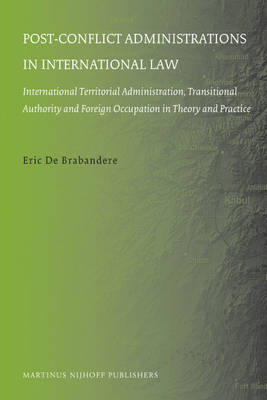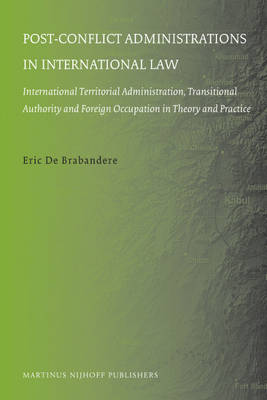
- Retrait gratuit dans votre magasin Club
- 7.000.000 titres dans notre catalogue
- Payer en toute sécurité
- Toujours un magasin près de chez vous
- Retrait gratuit dans votre magasin Club
- 7.000.0000 titres dans notre catalogue
- Payer en toute sécurité
- Toujours un magasin près de chez vous
Post-Conflict Administrations in International Law
International Territorial Administration, Transitional Authority and Foreign Occupation in Theory and Practice
Eric de Brabandere
Livre relié | Anglais
248,95 €
+ 497 points
Description
The concept of international administrations of territory, in which comprehensive administrative powers are exercised by, on behalf of or with the agreement of the United Nations has recently re-emerged in the context of reconstructing (parts of) states after conflict. Although in Kosovo and East Timor, the UN was endowed with wide-ranging executive and legislative powers, in the subsequent operations in Afghanistan it was decided, to principally rely on local capacity with minimal international participation, and in Iraq, administrative power was exercised by the occupying powers. The objectives are however very similar.
This work first delineates the origins of the granting of administrative functions to international actors, and analyses the context in which it has resurfaced, namely post-conflict peace-building or reconstruction. Secondly, the book methodically establishes the legal framework applicable to post-conflict administrations and peace-building operations, by taking into account the post-conflict scenario in which they operate. Based on these two analyses, an enquiry into the practice of the reconstruction processes in Kosovo, East Timor, Afghanistan and Iraq is undertaken, to analyse and understand the influence of the international legal framework and the different approaches on the implementation of the mandates. Finally, the book concludes with an analysis of questions on exit strategies, local ownership, the internationalisation of domestic institutions, and the need for a comprehensive approach towards post-conflict reconstruction.
This work first delineates the origins of the granting of administrative functions to international actors, and analyses the context in which it has resurfaced, namely post-conflict peace-building or reconstruction. Secondly, the book methodically establishes the legal framework applicable to post-conflict administrations and peace-building operations, by taking into account the post-conflict scenario in which they operate. Based on these two analyses, an enquiry into the practice of the reconstruction processes in Kosovo, East Timor, Afghanistan and Iraq is undertaken, to analyse and understand the influence of the international legal framework and the different approaches on the implementation of the mandates. Finally, the book concludes with an analysis of questions on exit strategies, local ownership, the internationalisation of domestic institutions, and the need for a comprehensive approach towards post-conflict reconstruction.
Spécifications
Parties prenantes
- Auteur(s) :
- Editeur:
Contenu
- Nombre de pages :
- 332
- Langue:
- Anglais
Caractéristiques
- EAN:
- 9789004170230
- Date de parution :
- 24-04-09
- Format:
- Livre relié
- Format numérique:
- Genaaid
- Dimensions :
- 165 mm x 246 mm
- Poids :
- 703 g

Les avis
Nous publions uniquement les avis qui respectent les conditions requises. Consultez nos conditions pour les avis.






